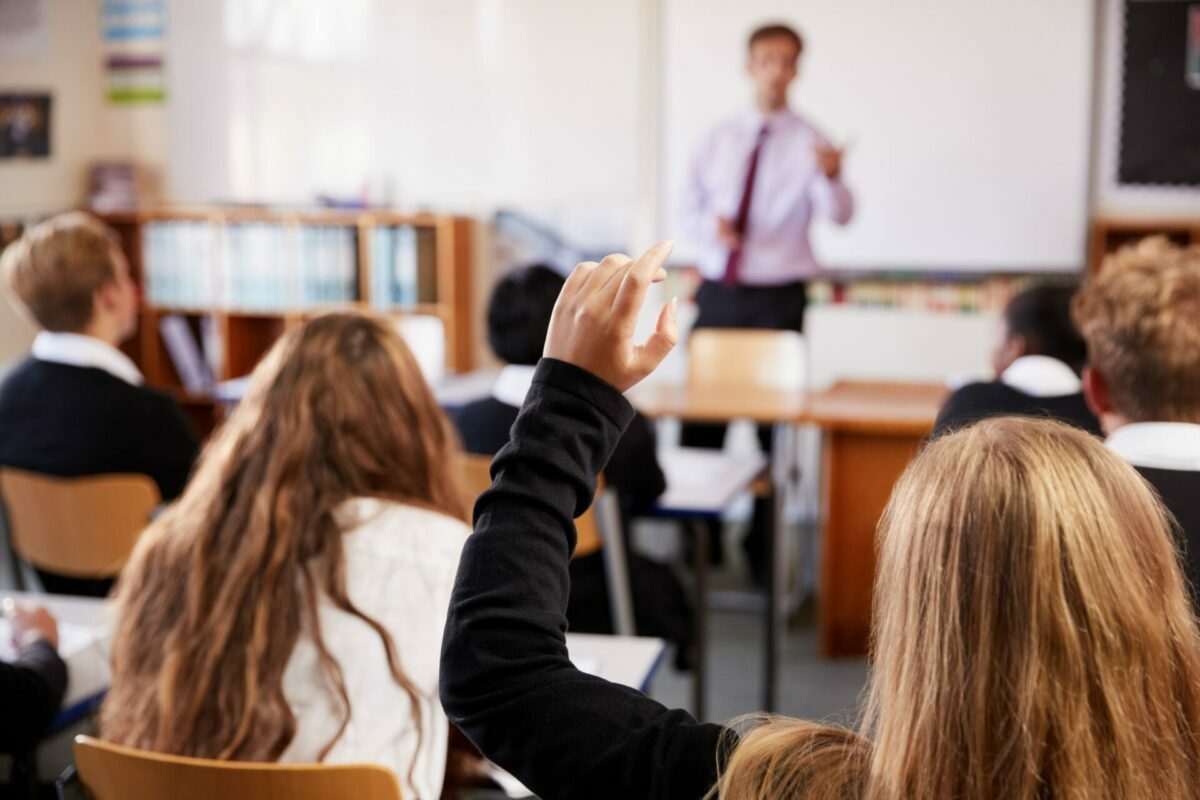New measures to tackle the “postcode lottery” of avoidable absence in schools

New proposals to tackle the postcode lottery of avoidable absence in schools have been announced by the government today (25 Jan).
A new consultation proposes that all schools have robust policies detailing how they will support pupils to attend as regularly as possible and sets out how legal intervention including penalty notices should be used in promoting good attendance by local authorities.
The number of pupils persistently absent increased to 501,642 in secondary schools in autumn 2020, compared with 454,167 in 2019, not including non-attendance in Covid circumstances.
The latest data shows a radically different approach to sanctions across the country, with some local authorities issuing no fines in 2020/21, while others issued over 1,500. The new standards will make sure interventions such as fines are always used when all other options have been explored.
Although the pandemic is still present and causing some unavoidable absence amongst teachers and staff, it has highlighted the importance of regular face-to-face education to allow all pupils to fulfil their potential.

Education Secretary Nadhim Zahawi said:
“I want every single child to have the opportunity to fulfil their potential, which only time in school with this country’s world-class teachers can bring. That’s why I will continue to give schools the tools they need to keep pupilsin class, whether that’s support with ventilation, testing or vaccinations, which all remain so vital.
“And as we transition from pandemic to endemic, it makes me even more determined to fight for children to be in school every day they possibly can be.
“Absence due to Covid is unavoidable, but there are other reasons children miss out on school too. Our new proposals will end the postcode lottery of how attendance is managed in different schools and parts of the country, and make sure every child and family gets the best possible support to attend school as regularly as possible.”

Schools Minister Robin Walker said:
“The time pupils spend in classrooms, with their friends and with our world class teachers, is fundamental to their development, education and the opportunities they have to succeed. We know that Covid has led to some unavoidable absences from school but that makes it even more important to reduce avoidable absence.
“So whether it’s through the support we are providing to schools to keep children learning face-to-face through the pandemic, or the proposals we have published today to help drive down avoidable absence in the medium and longer term, I will continue to do everything in my power to help make sure every young person can benefit from being in school, day in day out.”
Commenting on the consultation on pupil absence, James Bowen, director of policy for school leaders’ union NAHT, said:
“Fines have always been a relatively blunt tool when it comes to tackling persistent absenteeism. Whilst some clarity and consistency regarding how fines are used across the country might be helpful, the government will need to be prepared to go much further if it truly wants to make a difference in this area. Updated policies and clearer guidance alone won’t be enough.
“As all schools know, tackling persistent absenteeism requires a great deal of hard work, persistence and a range of different professionals working together to tackle the underlying issues facing pupils and families.
“Local Authorities, along with other agencies, can play a vital role in supporting schools in this work but they require sufficient funding to do so. We know that many have had to scale back the support they are able to offer schools as a result of financial pressures.
“We share the government’s ambition to ensure that every child has good attendance, and hope they are prepared to match that ambition with the appropriate level of resources.”
Today’s consultation comes as the latest school attendance statistics show 99.9% of schools are open, with 87.4% of pupils attending.
The Government continues to prioritise face-to-face education for pupils and confirmed yesterday that all schools that submitted eligible applications for an air purifier will receive them, alongside additional funding from NHS England to support with delivery of the vaccination programme.
As part of the plans to tackle avoidable absence, local authorities and academy trusts will be expected to have plans for how they will provide targeted support for pupils who need it and work with schools to help spread best practice across the school system in driving good attendance.
Schools are also being asked from today to sign up to a new daily attendance data collection trial. Data will be gathered directly from school registers, reducing administrative work and potentially helping schools, academy trusts, local authorities and central government spot and address system-wide issues more quickly if the trial is successful.
The Children’s Commissioner is also working with a number of local authorities to review interrogate their data and step up efforts to support children that are persistently absent from school.

Children’s Commissioner, Dame Rachel de Souza said:
“School is the best place for children to be. It’s crucial to their academic attainment and is a place they can make friends and play sports. I have always believed in the importance of school and in the largest ever survey of children `The Big Ask‘ children themselves how much they enjoy school and all it brings.
I am determined that we must get children back into the classroom. We must find those children who aren’t back in school, find out why they aren’t attending, and actively help them to find their way back in.
That’s why this work is so important, it is crucial to help children recover from the upheaval of the Pandemic and for them to able to thrive into the future.”
Sector response
The latest attendance figures show that around 415,000 pupils in state-funded schools in England did not attend school for Covid-related reasons on 20 January, up from 315,000 on 6 January, while a quarter of schools had 15% of their teachers and leaders off work.
The key findings from the DfE show:
- Shock doubling in number of pupils missing school with COVID – up from 159k to 322k in a fortnight
- 24% of schools were missing at least 15% of their teachers – up from 18% at the start of term on 13th January

Simon Carter, Director at RM:
“As it’s been two weeks since schools returned after the festive break, and the mood of the country is one of the “beginning of the end” towards the pandemic, it is concerning to see that infections amongst school children remains at record levels. The numbers of students and teachers forced to spend time away from the classroom is growing – not falling – with the latest data showing over a million children and over 100,000 teachers and teaching assistants missing school. The positive news – however – is that schools, teachers and pupils are much better prepared than a year ago, with many already switching to teach and learn remotely, confidently to offer lessons and work collaboratively online.
“And although Covid restrictions are gradually being scrapped, this is in part possible because digital learning has become a key component of the education landscape. Educators should continue to build on the recent fast-tracked digital transformation work they put in place during lockdowns one, two and three, to ensure that education remains a constant for all. Key to this, it’s imperative school staff feel confident using the right mix of technology, first and foremost. That means ensuring that every teacher has a proper understanding of how best to use it. Last year, research by RM found that 51% of teachers felt they needed a greater understanding of this technology to achieve better learning outcomes. Only, then, with the right training and technology in place can teachers guarantee pupils will receive the same high quality teaching online and off.
“The reality is that no one knows exactly when cases will ease, and that means some form of hybrid learning – alongside continued training to get the best from this approach – must be woven into the curriculum permanently. Whether it’s to help provision for a flood or snow day, education can now remain consistent even when the rest of the world is in flux.”

Stephen Morgan MP Shadow Schools Minister, said:
“Children and school staff are living the day-to-day reality of covid, but this government still doesn’t have a plan to support them.
“Pupil absence is soaring, and it is particularly alarming that almost a quarter of schools now have more than 15% of school leaders and teachers absent.
“Labour has been clear ventilation, vaccination and testing are key to keep schools moving and delivering Labour’s ambitious recovery plan to help every child thrive.
“The government must immediately publish complete figures on its volunteer teacher drive and get a proper workforce plan in place to support staff and students. Our children must not endure another wave of covid chaos because this government is distracted trying to covering up rule breaking at the heart of Downing Street.”

Paul Whiteman, general secretary of school leaders’ union NAHT, said:
“Schools are still seeing significant levels of disruption due to Covid, with both pupil and staff absence very high. Covid absence figures for pupils are the worst they have been this academic year.
“Schools are struggling to keep things running with nearly 10% of their staff off on average – but for some this is much higher. Our members are repeatedly telling us that they are having to drop everything to find cover and that just keeping things going is a challenge.
“School leaders and their teams are doing a brilliant job but they are still very much in the eye of the Covid storm and there is no escaping the fact that it is having an impact on education.
“This disruption is putting huge pressure on students in exam years. The government needs to look again at its plans and do more to reassure students that exams can be fair and will take into account differences in missed learning.
“If exams do go ahead, the decision to publish performance data this year must be reversed – it is clear that it would be a reflection of the impact of the pandemic on students and schools, not fit for the purposes of accountability.”

Geoff Barton, General Secretary of the Association of School and College Leaders, said:
“The passing of the first two full weeks of the spring term have seen attendance deteriorate further in our schools, with even more students and staff away from the classroom.
“Of particular concern is that almost one in ten of our teaching staff are away from work. As well as the impact on affected staff themselves, this also poses significant issues for leaders in trying to ensure they can continue to provide education for all pupils, including through the use of expensive and scarce supply staff. They need much more help from the government to meet the mounting costs they face.
“The government’s unexpected announcement last week that face coverings are now no longer recommended in classrooms, and from Thursday in communal areas, reduced the defences available to schools to control the spread of Covid-19.
“The contingency framework guidance continues to be that face coverings can be retained or reintroduced on the advice of local public health officials and the Department for Education in an individual school or across a local area if there is sufficient concern about Covid-19 infection rates in that area. While no one wants to see face coverings worn in schools for longer than is necessary, it is right that this should continue to be an option where public health officials believe it will help to stop local outbreaks.”

Natalie Perera, Chief Executive of the Education Policy Institute (EPI) said:
“While there are signs that the current wave of Covid may be slowing, today’s pupil absence data show that the disruption to schools is far from over.
“Our research has found an association between pupil absence from school and higher learning losses, so the considerable rise of 100,000 pupils absent is a cause for great concern.
“The government must continue to closely follow pupil absences this term and consider whether it needs to target additional financial support to pupils who have been out of school the most. It must also keep its approach to summer exams under review, and ensure that the current adjustments in place for pupils are a proportionate response to the disruption they’ve faced.”

Kevin Courtney, Joint General Secretary of the National Education Union, said:
“Covid-related absences have risen again, with 415,000 pupils absent due to covid on 20 January including one in 16 primary pupils. A quarter of schools now have at least 15% of teachers and school leaders absent, causing further disruption as we move into 2022. With coronavirus cases continuing to rise among school age children this disruption is going to get worse over coming weeks.
‘The DfE could have avoided much of this disruption by investing in ventilation and air filtration to suppress case numbers whilst vaccination is rolled out and these measures would have been made more effective by maintaining mask wearing.
‘Government has said that there will be advanced information about exam topics to help revision for those sitting exams in summer 2022. However, the reality of on-going staff and pupil absences due to COVID has meant education continues to be disrupted impacting on the ability of many, through no fault of their own, to cover all the required content. Clearly, being told what the focus of the exam is only once revision starts is of little use if the focus of the exam is a topic you haven’t had chance to cover in depth.
‘The additional disruption seen in today’s figures only raises further questions about this misguided plan and fairness for students in the summer. As government has refused to help teachers and students prioritise teaching and learning, by releasing the advanced information about topics earlier, they have a duty to ensure grades in the summer will be fair and to explain how they think that will be so.
‘In primary schools, Covid disruption once again raises questions about the usefulness of the government’s plans for bringing back SATs in May. Staff and pupil absences have interrupted learning frequently and unevenly. SATs results will reflect this and will be even less of a fair measure of children’s performance than they were before the pandemic, though schools will still be held to account for their scores. The government should recognise the problem and cancel statutory assessment in primary schools in 2022.”
The Department’s automated daily data collection trial will run over the coming months to assess:
- The quality of the data being collected and how well it allows the government to understand and manage sector-wide attendance trends;
- The potential for it to replace other forms of attendance data collection to reduce burdens on schools; and
- How the data can be made available to schools, trusts and local authorities to help them identify and manage local trends and issues.
At all times the Department will manage the data collected in compliance with data protection laws, and the Department’s own data protection policies.
The Department remains committed to a registration system for children not in school and will publish the relevant consultation response shortly.












Responses